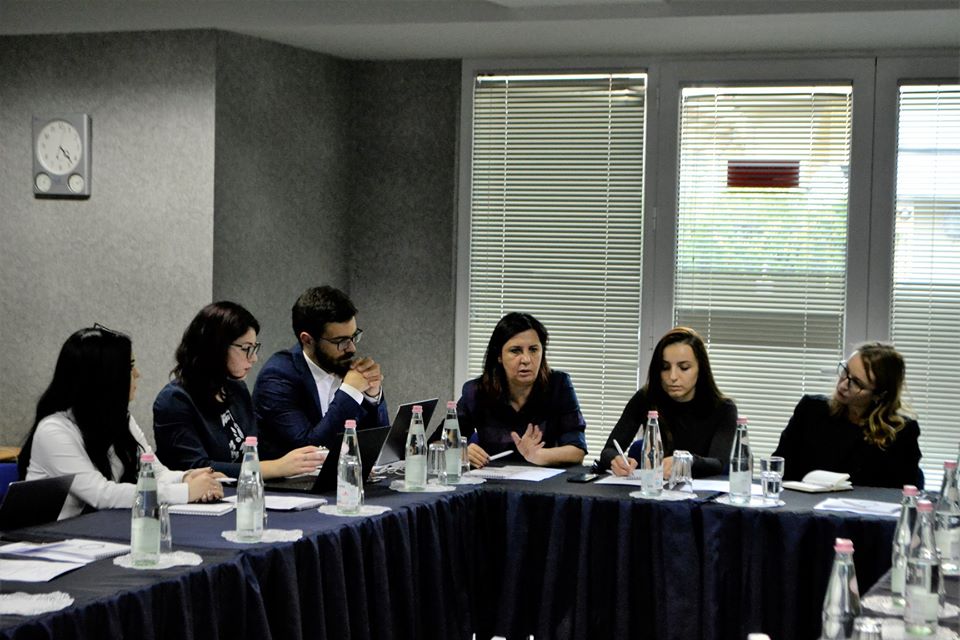29.10.2019

On October 29th took place the annual regional meeting of Western Balkans Youth Cooperation Platform (WBYCP). This meeting started with a short welcoming from the Head of Hanns Seidel Foundation Office in Tirana, Mrs. Nertila Mosko, who highlighted the importance of youth connectivity and cooperation in the Western Balkans region. Hanns Seidel Foundation remains committed to support to WBYCP in a long term perspective, as it values this unique and concrete structured cooperation mechanism connecting, empowering and supporting the National Youth Umbrella organizations in the region. Mrs. Krisela Hackaj, emphasized that Cooperation and Development Institute (CDI) values very much the joint work in the frame of WBYCP and after 3 years of building ties, trust, friendships, and structured cooperation in youth sector, we are even more committed to progressively enhance and boost our unique work approach and contribute to a more cohesive, connected and empowered network of youth councils.
The meeting continued with the presentation of the main highlights from the countries research and the actions that WBYCP partners will take to address the youth issues. Mrs. Dafina Peci from the National Youth Congress of Albania stated that young people in Albania believe that the implementation of more vocational trainings, the development of internships and traineeships, and the career orientation according to labor market needs can improve the unemployment challenge. This will address the un-satisfaction expressed from 68% of the asked youngsters who reported to be 'Completely Unsatisfied' with the actions undertaken by the local and central institutions to foster Youth Employability.
Mrs. Ema Selimovic, from Bosnia and Herzegovina Association for United Nations, said that according to their research among young people in Bosnia and Herzegovina, aged 15 to 30, only 1 percent participates in youth representative bodies, 5 percent in youth organizations and 6 percent in political parties. Youth in BiH would participate more actively if it were not for the lack of willingness of decision makers to implement existing and create new laws and strategies to address youth issues. Mrs. Rita Zabergja, from Kosovar Youth Council, said that the quality of learning curricula in Kosovo is poor and mainly sourced by a single author and not updated with current developments. Meanwhile, one of the main challenges of education in the country remains the creation of proper learning environment in schools and universities.
Mrs. Andrea Micanovic, from High School Students Union of Montenegro, stated that the formal education system in Montenegro does not recognize the importance of non-formal education enough, and the students often do not feel supported or encouraged by their school staff to participate in the activities of non-formal education. It is identified that high school students in Montenegro are lacking information on non-formal education activities and this comes even from the lack of awareness of the school staff and parents. Mrs. Angela Nikoloska, from the National Youth Council of Macedonia, said that the high rate of unemployment was always one of the biggest issues that the country was facing. This problem is especially visible with the rate of youth unemployment, where according to the latest statistics, even today the number is as high as 46,95%. This problem needs an adequate response from the governmental structures.
Mr. Samedin Rovcanin, from the National Youth Council of Serbia, pointed out that the country report prepared by KOMS highlights the existence of a low degree of political youth participation and it warns about the distrust of young people in political actors and institutions. This shows that political stakeholders are detached and disconnected from young people, programme-wise. In addition, autonomous and independent youth wings of political parties and strong institutional mechanisms that support youth participation are very much needed.
A final publication with all country reports and policy recommendations will be finalized very soon.
WBYCP tradition to formulate and outreach the annual partners' work continued with the drafting and signature of the Joint Statement 2019, which can be read here.
Partners will continue advocate on the three back-bone priorities: Education, Employment, and Participation, and the needed measures for achieving a balanced personal development in a progressive social and economic context in this region.
More photos of the event can be found here.